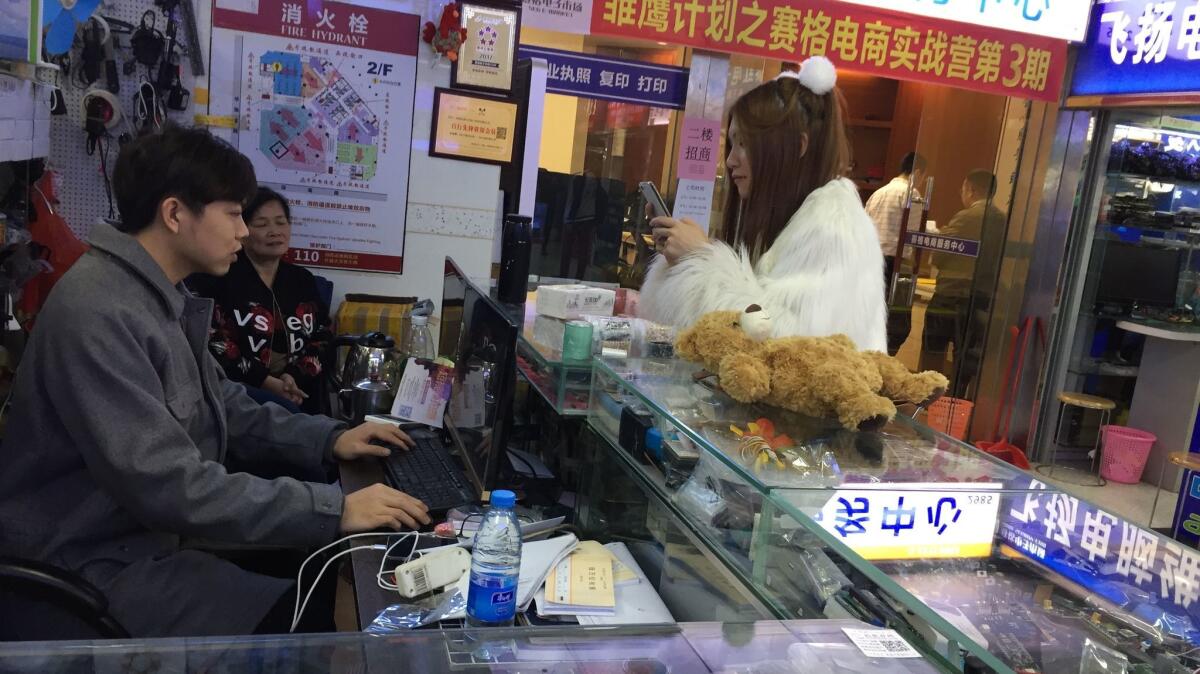China’s ‘sexy cyborg’ took on Silicon Valley bro culture — and won

Most of Naomi Wu’s projects center on wearable technology for women. (Dec. 8, 2017) (Sign up for our free video newsletter here http://bit.ly/2n6VKPR)
Reporting from Shenzhen, CHina — There’s no mistaking Naomi Wu amid Shenzhen’s deliverymen and investors.
Her long, auburn-dyed hair falls over tight, low-cut tops; her miniskirts reveal more. Wu often wears these outfits in do-it-yourself videos that show her devising an LED-lit skirt or creating heels that hide hacking tools.
Wu calls herself a “sexy cyborg.” She also calls herself a “maker,” the term for tech hobbyists who build creative DIY projects. Her endeavors have earned Wu 157,000 subscribers on YouTube and more than 43,000 Twitter followers in a country that blocks both platforms. She has more than 700 supporters on Patreon, a crowd-funding site.
But in recent weeks she’s received even more attention — first from skeptical online commentators and then from Dale Dougherty, a California executive who helped launch the maker movement. They accused her of fraud.
Their remarks not only challenged her brand, they dismissed her ability. They took unsupported aim at an aspiring woman in a male-dominated industry — and, in particular, a young Chinese female who likes to dress revealingly.
That set off a social media tirade that spread across continents, underscoring the rigidity of gender stereotypes and the Internet’s powerful role in determining a person’s fate.
“It doesn’t make sense,” said Wu, 23, speaking in rapid-fire English outside one of the world’s largest electronics markets. “Competent women never doubted me.”
Wu works as a freelance web developer in China’s electronics manufacturing hub, a southeastern coastal city that grew from a collection of fishing villages into one of the country’s wealthiest metropolises.
The city is home to Tencent, the social media company that temporarily surpassed Facebook in market value. Apple recently established a research and development center here. Wu takes pride in her city, like she does in her creations.
Most of her projects center around wearable technology for women, such as LED eyelashes or a makeup case that holds a tiny computer. She also tests products in her videos, and films 360-degree tours around Shenzhen’s tech spaces.

“I’m determined, diligent, and I work hard,” Wu said, striding through Huaqiangbei, a mecca of electronics goods shipped throughout the world. Wu, clad in a sea-green jumpsuit and white lace-up boots, ignored the male eyes peering from beyond mountains of mouse pads and microchips. “Visibility is very important to me,” she said.
Even before the accusations, online comments questioned Wu’s near fluent English (she was an English major) or her technical skills (she taught herself to code because she was an English major and needed work).
But the attacks grew more pronounced this fall, when an anonymous blog post claimed Wu was the face of a boyfriend’s operation. Wu insisted the projects were her own creations.
Then Dougherty got involved. He’s often referred to as the father of the movement, which promotes everyday creators from basement tinkerers to inventors of talking robots. Dougherty also runs Maker Media, a San Francisco media company that publishes Make: magazine and organizes events for the industry known as Maker Faires.
Wu had criticized Dougherty online for excluding her from such events and attacked him personally. He responded in November.
“Naomi is a persona, not a real person,” he tweeted. “She is several or many people.”
Dougherty told his nearly 26,000 followers to send him a direct message for more information. Then the small spat turned into an international battle.
Wu said employers started pulling out of potential deals or asking more questions about her work.
Other makers began demanding Dougherty’s resignation. Andrew “bunnie” Huang, an American researcher and hacker, wrote a 2,345-word defense of Wu on his blog.
“It’s not a big leap for me to accept Naomi as a Maker,” he said in the post. “I do my best engineering when sitting half-naked at my desk. … I don’t have the strength to challenge these social norms” that associate certain dress with intelligence. “Secretly, I’m glad someone is.”
Naomi is just a flash point ...because she is extremely vocal and not ashamed of her femininity.
— Andrew “bunnie” Huang, an American researcher and hacker
Two days after his tweet, Dougherty apologized. He followed it with a more comprehensive mea culpa in Make:, calling his comments “completely inappropriate.”
His words, he said, “reflected my unconscious biases; and the negative impact of my tweets were amplified by the fact that I, a white, Western, male CEO of a key company in the Maker community publicly questioned a young, female, self-employed Chinese maker.”
He offered to put Wu on the cover of the magazine and include a story about her work. He also invited her to participate in an advisory board for events in China.
Dougherty, in an email, confirmed the magazine is working on a piece about Wu for the next issue, but declined to say more.
“Dale was wrong, and he knows that,” said Sherry Huss, vice president of Maker Media. “It was really just an unfortunate situation.”
Huss, who helped start Maker Faires 12 years ago, said the movement is by nature an inclusive one. “It’s people that are curious and have a creative mind, that’s the group we’re trying to appeal to,” she said.
Maker Media partners with another company for the Shenzhen fair, which Huss attended in mid-November. Event organizers pulled together a meeting of 13 women to discuss their experiences.
“The conversations have started and the healing has begun, and that’s a good sign,” Huss said.
Wu considers the situation resolved — although it refuses to die on the Internet.
“Naomi is just a flash point for the issue because she is extremely vocal and not ashamed of her femininity,” Huang said in an email. “It’s kind of disappointing that it takes someone so far from the average to make progress.”
Mao Tse-tung, the founder of modern China, encouraged women to join the labor force in his quest for an industrialized society. Despite that legacy, Chinese women still struggle to achieve top positions in academia and politics. No woman has reached the highest rung of power, a seven-member leadership panel. Only one serves on the 25-member Politburo.
Chinese women find more success than those in the U.S. when it comes to tech, according to a 2016 report by Silicon Valley Bank. Nearly 80% of Chinese startups include one high-level woman, it concluded, compared with 54% of American startups.
Zhou Qunfei, founder of touch-screen maker Lens Technology, labored in factories before she ran them. Now she’s the world’s richest self-made woman. Hu Weiwei, a 35-year-old former journalist, heads China’s hugely successful bike-sharing service, Mobike.
That advancement only goes so far. The World Economic Forum’s global gender gap index ranks China at 100 out of 144 countries, above Turkey and Korea but below Tajikistan and India. Despite China’s increasing affluence, its spot has fallen for nearly a decade.
Discrimination persists in more nuanced ways, analysts say, from not hiring a woman near childbearing age to assuming a foreign male has more expertise.
“There’s this perception that if you are the woman, you must be the translator,” said Law Yee Ping, founder of Hong Kong Innovation Services, which works with makers in Shenzhen.
Law admitted to her own bias when she first heard about Wu. “On second thought, I said, ‘We have a right to choose what we wear.’”
Much like her wearable designs, Wu considers her visibility a tool to defy norms of appearance and profession. That commitment, she said, has only intensified.
“Every day now, I’m doing everything I can to promote women in tech,” she said, before resuming her shopping — for a new microcontroller.
Meyers is a special correspondent.
Twitter: @jessicameyers
ALSO
In Beijing, a mass eviction leads to a rare public display of rage
Hillary Clinton, taking a different tone than Trump, hits China on human rights and South China Sea
North Korea’s missile launch is a triumph for the rogue nation, ‘worrisome’ for the world
More to Read
Sign up for Essential California
The most important California stories and recommendations in your inbox every morning.
You may occasionally receive promotional content from the Los Angeles Times.










